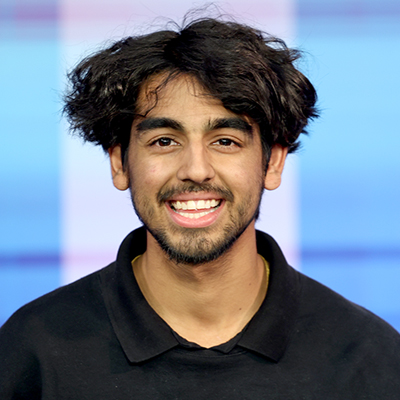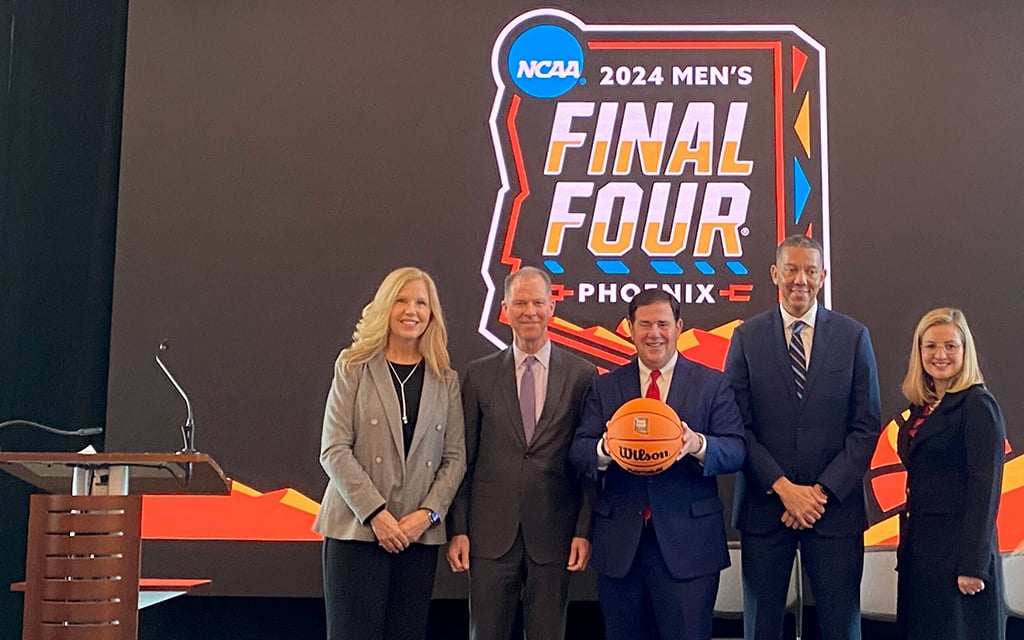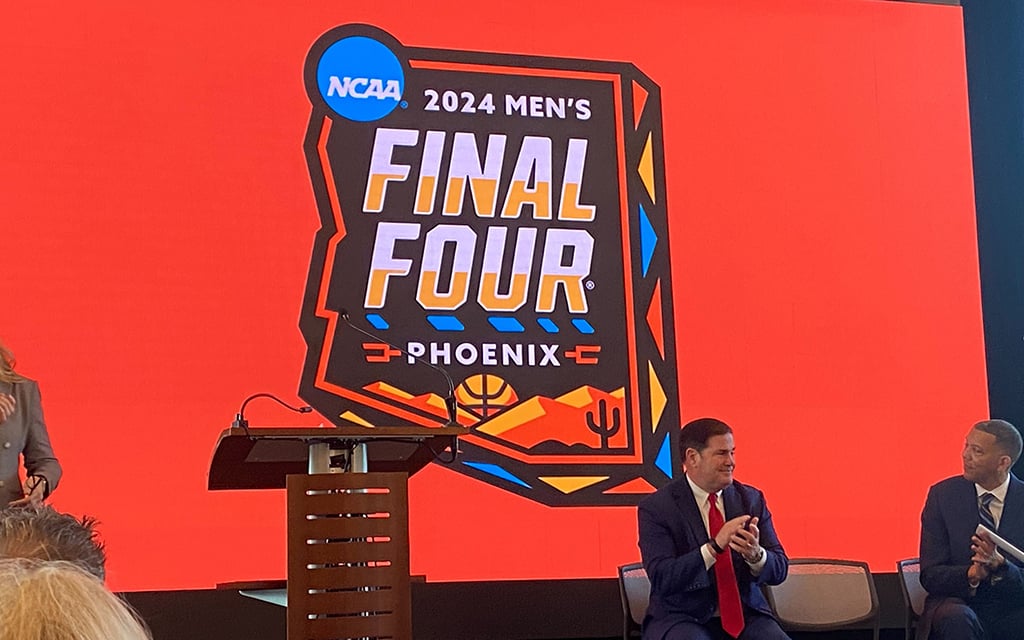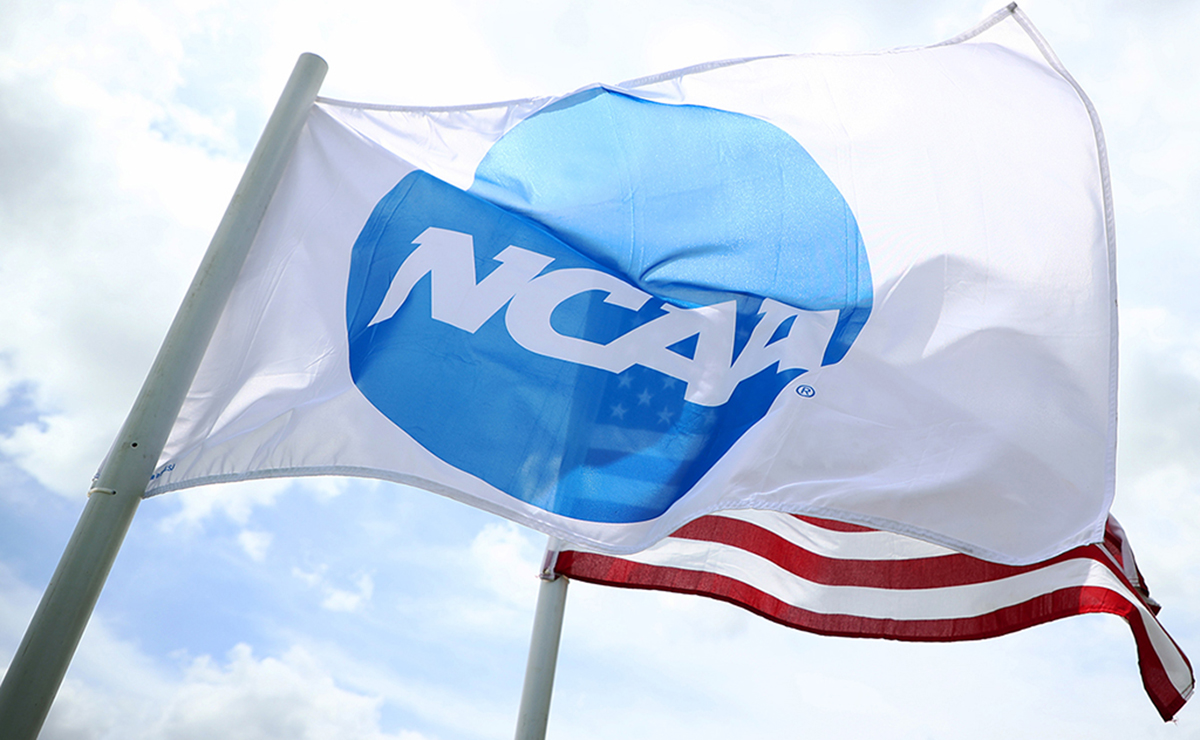PHOENIX – Arizona is no stranger to hosting the nation’s biggest sporting events of the year. Look no further than the upcoming Fiesta Bowl on Dec. 31 and the 2023 Super Bowl in February.
It will mark Glendale’s second Super Bowl since 2015, which the state followed by hosting the College Football Playoff National Championship in 2016 and the NCAA Men’s Final Four in 2017.
“The combined economic impact was nearly $1.3 billion according to studies by Arizona State’s W.P. Cary School of Business,” Governor Doug Ducey said of the three-year stretch. “As the front door to economic development, tourism provides the perfect stage to showcase the state.”
The NCAA Men’s Final Four will return to Phoenix in 2024, and the countdown clock has started with Wednesday’s logo reveal in downtown Phoenix. The goal behind creating the logos has always been to use the host city as their inspiration and let the local committee do the rest of the design.
The 2024 design took months to make, but the positive reaction was immediate.
“They designed the logo, but they want to use images of our destination, they want to see what we encompass,” said Debbie Johnson, the co-chair of the Phoenix Local Organizing Committee. “That’s why you can see the desert colors in it very broadly, and you can see the mountains.
“I just love the logo because it encompasses our entire state, and I love that they made the logo about the destination.”
“When you look at that logo there are very unique characteristics about it that point to Phoenix and points to the Valley and how it interconnects with the Final Four,” said Dr. Charles McClelland, the Chairman of the NCAA Division I Men’s Basketball Committee.
The 2017 Final Four was played at the then-called University of Phoenix Stadium in Glendale and featured North Carolina, Oregon, South Carolina and Gonzaga.
In what was a thrilling finish, North Carolina edged out Gonzaga, 71-65, for their sixth men’s basketball championship. The game drew over 76,000 fans, which is the second-highest total for the title game in tournament history, said NCAA senior vice president of basketball Dan Gavitt.
Along with the intriguing matchups, fans also experienced a full-blown music festival that featured a plethora of music stars and bands such as The Chainsmokers, Keith Urban Aerosmith, Blink-182 and Macklemore & Ryan Lewis.
“Phoenix does sports well, and we are committed to creating great memories and an amazing experience,” Arizona Mayor, Kate Gallego said. “We loved the incredible energy of the Final Four in 2017, and we are ready to capture that in 2024. … The three-day March Madness music festival drew 135,000 music lovers to Phoenix dance parks which reached capacity.”
Phoenix has changed immensely as a city and community since 2017, and will offer fans newer attractions to enjoy this time around with the changed skyline in downtown Phoenix and more event venues.
Another change is the city’s entry into the national basketball conversation due in part to the recent success of the Suns and Mercury combining for two championship appearances over the last three years, not to mention the rising talent at the prep level. Gilbert Perry’s Cody Willaims is ranked No.14 in ESPN’s Top 100 and AZ Compass Prep’s Tru Washington is No. 86 among the class of 2023 prospects.
But whether the city remains the premier West Coast location for the biggest stages in sports remains to be seen. In November, the NCAA named Las Vegas host of the 2028 NCAA Men’s Final Four at Allegiant Stadium. The news comes after the city was awarded the 2024 Super Bowl last December. Earlier this year, the 2022 Super Bowl was held at the newer SoFi Stadium in Inglewood, California, which will bring more competition to Arizona’s future prospects.
Ultimately, the road to landing the next Final Four may not be as smooth.



